Join Our Newsletter To Be Informed When New Videos Are Posted
Join the thousands of fellow Studends who rely on our videos to learn how to read the bible in Hebrew for free!
Hebrew Text
וַיִּשְׁלַח מַלְאָכִים אֶל־בִּלְעָם בֶּן־בְּעוֹר פְּתוֹרָה אֲשֶׁר עַל־הַנָּהָר אֶרֶץ בְּנֵי־עַמּוֹ לִקְרֹא־לוֹ לֵאמֹר הִנֵּה עַם יָצָא מִמִּצְרַיִם הִנֵּה כִסָּה אֶת־עֵין הָאָרֶץ וְהוּא יֹשֵׁב מִמֻּלִי׃
English Translation
So he sent messengers to Bil῾am the son of Be῾or to Petor, which is by the river, to the land of the children of his people, to call him, saying, Behold, there is a people come out from Miżrayim: behold, they cover the face of the earth, and they abide over against me:
Transliteration
Va'yishlach mal'achim el-Bil'am ben-B'or P'tora asher al-hanahar eretz b'nei-amo likro-lo leimor hinei am yatza mi-Mitzrayim hinei chisa et-ein ha'aretz v'hu yoshev mimuli.
Hebrew Leining Text
וַיִּשְׁלַ֨ח מַלְאָכִ֜ים אֶל־בִּלְעָ֣ם בֶּן־בְּעֹ֗ר<sup class="footnote-marker">*</sup><i class="footnote">(בספרי ספרד ואשכנז בְּע֗וֹר)</i> פְּ֠ת֠וֹרָה אֲשֶׁ֧ר עַל־הַנָּהָ֛ר אֶ֥רֶץ בְּנֵי־עַמּ֖וֹ לִקְרֹא־ל֑וֹ לֵאמֹ֗ר הִ֠נֵּ֠ה עַ֣ם יָצָ֤א מִמִּצְרַ֙יִם֙ הִנֵּ֤ה כִסָּה֙ אֶת־עֵ֣ין הָאָ֔רֶץ וְה֥וּא יֹשֵׁ֖ב מִמֻּלִֽי׃
וַיִּשְׁלַ֨ח מַלְאָכִ֜ים אֶל־בִּלְעָ֣ם בֶּן־בְּעֹ֗ר*(בספרי ספרד ואשכנז בְּע֗וֹר) פְּ֠ת֠וֹרָה אֲשֶׁ֧ר עַל־הַנָּהָ֛ר אֶ֥רֶץ בְּנֵי־עַמּ֖וֹ לִקְרֹא־ל֑וֹ לֵאמֹ֗ר הִ֠נֵּ֠ה עַ֣ם יָצָ֤א מִמִּצְרַ֙יִם֙ הִנֵּ֤ה כִסָּה֙ אֶת־עֵ֣ין הָאָ֔רֶץ וְה֥וּא יֹשֵׁ֖ב מִמֻּלִֽי׃
🎵 Listen to leining
Parasha Commentary
📚 Talmud Citations
This verse is quoted in the Talmud.
📖 Sanhedrin 105a
The verse is discussed in the context of the story of Balaam and Balak, focusing on the sending of messengers to Balaam and the implications of their mission.
📖 Sotah 11a
The verse is referenced in a discussion about the Exodus from Egypt and the subsequent events involving Balaam and the Israelites.


Context of the Verse
This verse (Numbers 22:5) describes Balak, king of Moab, sending messengers to Bil'am (Balaam) to curse the Jewish people. The verse appears in the broader narrative of Parashat Balak, where Balak fears the Israelites after their miraculous exodus from Egypt and their military victories.
Rashi's Commentary
Rashi explains that Balak's fear stemmed from seeing the Israelites' success in battle against Sichon and Og (Numbers 21:21-35). He notes that Balak exaggerated the Israelites' numbers by saying, "they cover the face of the earth", to incite Bil'am's concern. Rashi also highlights that "Petor" refers to Bil'am's hometown, emphasizing his status as a renowned sorcerer among the nations.
Ibn Ezra's Insight
Ibn Ezra focuses on the phrase "the land of the children of his people", suggesting that Bil'am was from a people closely related to Moab (possibly Midianites or Ammonites). He also notes that Balak's messengers were sent to persuade Bil'am by emphasizing the threat posed by the Israelites.
Midrashic Interpretation
The Midrash (Bamidbar Rabbah 20:7) elaborates on Balak's motives, stating that he recognized the divine protection over Israel and sought supernatural means (through Bil'am's curses) to counteract it. The phrase "they cover the face of the earth" is interpreted as a reference to the Israelites' encampments, which were arranged in an orderly, divinely prescribed manner (as per their tribes).
Rambam's Perspective
In Moreh Nevuchim (Guide for the Perplexed 1:36), Rambam discusses Bil'am as a prophet of the nations, contrasting his flawed character with the righteousness of true Jewish prophets. He explains that Balak sought Bil'am precisely because of his reputation for effective curses, demonstrating the pagan belief in the power of words.
Key Themes